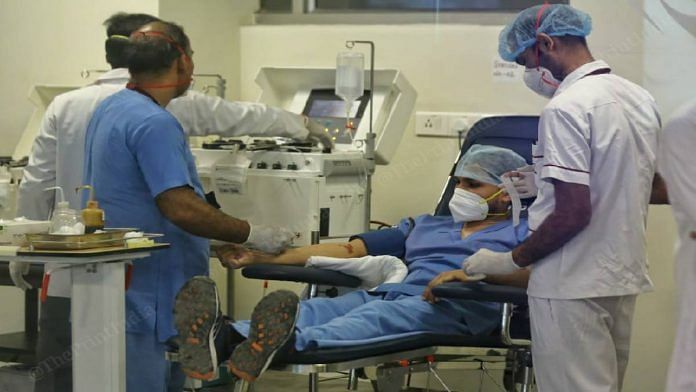New Delhi: The Union Ministry of Health and Family Welfare has started meetings to put together a standard operating procedure (SOP) for plasma therapy — a line of Covid treatment the government was on the verge of junking — after a nudge from Home Minister Amit Shah, ThePrint has learnt.
At a meeting held Sunday to review the Covid situation in Delhi, Shah emphasised on the need to ensure that convalescent plasma given to coronavirus patients contains neutralising antibodies, a senior government official who attended the discussion said.
The decision to devise an SOP for plasma therapy comes days after the Union Secretary for Health Research and Indian Council of Medical Research (ICMR) chief Dr Balram Bhargava said the government is in the process of removing plasma therapy from the list of Covid treatments. This decision was based on an ICMR trial that reportedly proved the therapy ineffective.
However, as reported by ThePrint last month, the ICMR trial — named PLACID, its results have since been published in the BMJ — had reached its conclusion without actually testing the plasma for neutralising antibodies before it was administered to Covid patients. The trial, according to investigators, did not look for the presence of neutralising antibodies because reliable tests to detect them were not available in India when the study was launched on 22 April.
A virus or a bacteria in the body can generate different kinds of antibodies, which fight off infection, depending on which antigen has triggered their production. Antibodies against the SARS-CoV-2, for example, can be either against its nuclear protein or against the spike protein. It is only the latter that have a protective effect. They are known as neutralising antibodies (NAb).
“The home minister, during the meeting, made the point that he had been told by senior doctors that, in most cases, plasma is being donated and administered in a bout of over-enthusiasm without doing the related checks on the antibody titre to see if neutralising antibodies are present or not,” the official said. “That is why the health ministry has now started work on clearly laying down the protocol for plasma therapy. Whether it will actually lay down the need to check for neutralising antibodies is a question that only the scientists can answer,” the official added.
Also Read: ICMR says no, but here’s why doctors are still keen on plasma treatment for Covid patients
Central govt to rush 250 ventilators to Delhi
Meanwhile, at another review meeting chaired by Union Home Secretary Ajay Bhalla Monday to discuss the Covid situation in Delhi, it was decided that the central government will rush 250 ventilators and 35 CPAP and BiPAP machines to the Defence Research and Development Organisation (DRDO) Covid facility near the IGI Airport domestic terminal within the next 72 hours, a senior government official present at the meeting said.
This will be used to double the number of ICU beds at the Sardar Vallabhbhai Patel Hospital to 500 from 250. The human resources will be sourced from the armed forces and also from central government hospitals.
According to researchers from the US’ Baylor College of Medicine, “Continuous positive airway pressure (CPAP) machines are used in people who are breathing spontaneously but need a little help with the airway pressure”.
“CPAP differs from bilevel positive airway pressure (BiPAP) where the pressure delivered differs based on whether the patient is inhaling or exhaling. These pressures are known as inspiratory positive airway pressure (IPAP) and expiratory positive airway pressure (EPAP). In CPAP, no additional pressure above the set level is provided, and patients are required to initiate all of their breaths,” the researchers added.
The steps to be taken constitute the “first phase, in which we will double the ICU beds in the facility and all 500 beds will have ventilators”, the official said.
“Doctors will be roped in from the armed forces and the Government of India hospitals. As for the Chhatarpur facility, since it is run by the Delhi government, they will get back to us on the requirements and the plan on how many of the 1,000 beds they want to equip with oxygen,” the official added. “These will be for patients who do not need ICU care. There are already some oxygen cylinders at the facility, we will add some more.”
Teams to check on Delhi hospitals
A decision has also been taken to form flying squads that will visit private hospitals in Delhi and surrounding areas to check on compliance on various counts such as the number of RT-PCR tests being done and the turnaround time, and whether bed availability status is prominently displayed, among other things.
Ten such teams have been formed that will start visiting hospitals immediately and submit their reports within two days to both the ministries of home affairs and health.
Also Read: Busting Covid myths on plasma therapy and remdesivir, and what India’s falling numbers mean



